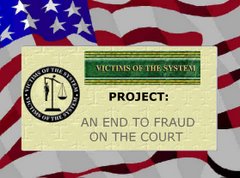The Draft Rules Governing the Processing of Judicial Misconduct Complaints Will Not Stop Their Systematic Dismissal by Federal Judges, Who Thus Self-exempt from Accountability for Their Coordinated Wrongdoing
Last October 15 finished the period for filing public comments on the draft rules to amend the current rules for handling complaints filed by anybody against a federal judge under the Judicial Conduct and Disability Act of 1980. Neither the Act nor these rules establish standards of complainable misconduct or disability, let alone what discipline judges are to mete out to themselves. They set up a system of judicial self-discipline and only prescribe the procedure for federal judges to process complaints filed against them.
Since a man cannot be impartial in his own cause, self-discipline does not work. Judges, who were rendered neither more honorable nor incorruptible upon their politics-determined nomination by the President and confirmation by the Senate, have proved to be mere men and women as incapable of self-discipline as their neighbor.
7,462 judicial misconduct complaints,
but only 9 judges disciplined in 10 years!
Indeed, out of the 7,462 complaints filed against federal judges in the 10-year period 1997-2006, they disciplined only 9 of their peers! These are official statistics that the judges must file by law with the highest administrative body of the federal judiciary, i.e., the Administrative Office of the U.S. Courts, whose director is appointed by the Chief Justice of the Supreme Court. Both review them with the court of appeals chief judges that produce them when they meet twice a year in the Judicial Conference of the U.S., the judiciary’s highest policy-making body, whose Committee on Judicial Conduct and Disability, formed by judges, drafted the rules at the request of the Chief Justice, who once was also a lower court judge as were the other Justices. (28 U.S.C. §§332(g), 604(h)(2),331 4th par., 601)
They all have known about these statistics and what they prove: That all of them, from the bottom to the top of the Judiciary, have engaged in, tolerated, and benefited from, the systematic dismissal of complaints against them! (The statistics are collected with links to the originals in http://Judicial-Discipline-Reform.org/judicial_complaints/DrCordero_draft_rules.pdf
Their systematic dismissal of complaints against them amounts in practice to the unlawful abrogation of an Act of Congress by judges sworn to uphold the law. By systematically dismissing those complaints, judges have self-exempted from any discipline: They have abused their judicial power in self-interest and to the detriment of all the complainants, whom they have left to suffer at the hands of the complained-about judges.
Types of serious judicial wrongdoing excused by the judges' self-exemption
Fearing no disciplinary, let alone penal, consequences, the judges have engaged in, and tolerated, the types of misconduct and disability under which they classify complaints: abuse of judicial power, prejudice, bias, conflict of interests, bribery, corruption, undue decisional delay, incompetence, neglect, mental or physical disability, and judicially unbecoming or abusive demeanor.
Since they ensure their unaccountability, they have managed an inherently suspicious feat: Though there have been tens of thousands of federal judges in the 218 years since the creation of the federal judiciary in 1789, the number of those impeached and removed from the bench is 7!
(official statistics at http://www.fjc.gov/history/home.nsf >Judges of the U.S. Courts>Impeachments of Federal Judges)
Ordinary men and women as judges are, they would not give up such extraordinary privilege: They are above the law. Hence, the draft rules are practically a carbon copy of the current rules that have served them so well. To conceal this fact as much as possible and put their peers also beyond public scrutiny, the judges on the Committee on Judicial Conduct and Disability announced the release of their draft rules on one single website, that of the barely known Administrative Office, and held only one single hearing in the whole country: in a district court not covered by a press corps. The public comments that they requested on the rules, have not been made public.
Yet, this commentator managed to obtain a copy of the official transcript of the hearing and is making it and his comments public through the first link above.
Neither AG Nominee Judge Mukasey nor Congress
will investigate the systematic dismissal of misconduct complaints
but a Watergate-like Follow the money! investigation
can expose coordinated judicial wrongdoing
Neither the systematic dismissal of complaints nor the abuse of judicial power will need to stop if Judge M. Mukasey is confirmed as Attorney General, for he was a participant and would incriminate himself if he ordered this coordinated judicial wrongdoing investigated. (See evidence in (http://Judicial-Discipline-Reform.org/judicial_complaints/JMukasey_2.pdf)
Nor will they be voluntarily investigated by Congress, described by its Speaker, H.P. N. Pelosi, as "dominated by the culture of corruption", so that its members are leery of becoming known as ‘judicial inquisitors’, for if their own corruption landed them in court, the judges could exploit the opportunity to retaliate.
However, Congress could be forced to investigate judges and reform the judiciary by a public outraged at the exposure of the judges’ coordinated wrongdoing, in general, and one of its most egregious manifestations, in particular: a fraud scheme in bankruptcy, an area in which judges control annually tens of billions of dollars. This would be the purpose of a Watergate-like Follow the money! investigation conducted by judicial reform advocates and investigative journalists, as set forth in http://Judicial-Discipline-Reform.org/Follow_money/investi_jour_proposal.pdf
For details on how to join the Follow the money! investigation, contact:
Dr. Richard Cordero, Esq. at DrRCordero-collaboration@Judicial-Discipline-Reform.org
